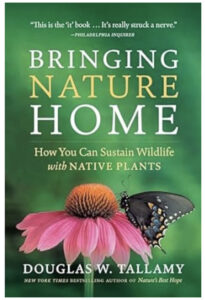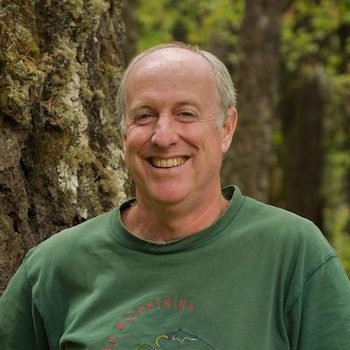Nature’s Best Hope — Doug Tallamy Presentation
by Sylvia Sloan, Fairfax Master Gardener
 Doug Tallamy signed my copy of his book Bringing Nature Home and included this with his signature: “Garden as if life depended on it!” After hearing his presentation, I would add “because it does!”
Doug Tallamy signed my copy of his book Bringing Nature Home and included this with his signature: “Garden as if life depended on it!” After hearing his presentation, I would add “because it does!”
You don’t have to listen to Tallamy, to realize that our world has changed drastically. How many lightning bugs have you seen this summer? Any turtles or toads living in your yard? Do you have lots of birds singing from your branches? Do you even have a tree in your yard (and if so, is it a native?). How often do you have to clean your car windshield of insect debris? Do you see rabbits in your yard in the evening munching on your dandelions? Do foxes or deer wander through your yard? Go in your yard and close your eyes — do you hear birds, crickets or tree frogs — or do you hear automobiles, trucks, sirens and planes? Have you ever heard an owl calling at night? On a summer afternoon, is it pleasant to sit in your yard, or are you melting in the hot summer sun?

Doug Tallamy
Do you care about your neighborhood’s environment — I’m talking about the insects, animals and plants that share our world — right here where we live. If you do care –either for yourself or your children and grandchildren, then you may want to read and take to heart Tallamy’s suggestions for “saving our planet” (my words). You can start by doing just a few things.
- Remove all invasives. Do you have English Ivy growing up your trees; do you have beds of Ivy growing, thinking it’s easier to care for than grass? Do you have a Bradford Pear tree that you love in the spring? How about Liriope edging your plant beds? These are just a few of the invasive plants that are of concern in Northern Virginia because of the harmful effect on our environment.
- Shrink the lawn. Think of your lawn as an oriental carpet rather than wall-to-wall carpeting. Create beds around your trees — and if you don’t have trees in your yard, then plant them! Create beds to line your walkways and driveway. Cut your lawn in half, create viable habitats and increase the biodiversity in your yard by adding plants native to your area. A blue spruce tree is a native tree — in Colorado. Isn’t as valuable for our wildlife in Northern Virginia!
- Plant Keystone plants. As defined by Tallamy, these are the species that are more important to the sustainability of ecosystems than others. Keystone plants are essential –14 percent of native plants make 90 percent of the food for caterpillars — and caterpillars are indispensable for life as we know it. In our Mid-Atlantic area, Oaks are keystone plants.
- Cut the lights. Add motion sensors or replace outside bulbs with yellow lights. Wherever human light spills into the natural world, some aspect of life for animals — migration, reproduction, hunting and feeding — is affected. According to the International Dark Sky Association, the animals most affected by light pollution are: Sea Turtles, Frogs and Toads, Hummingbirds, Sweat Bees, Monarch Butterflies, Bats, Owls, Insects and Fireflies. Light pollution also affects many areas of human health — check that out if you’re not convinced.
- Allow caterpillars to complete their development. Caterpillars are the primary food source for baby birds; caterpillars develop into pollinators. Neither humans nor baby birds will survive without caterpillars. Do not remove leaf litter that falls under trees. Instead, use it as mulch — many insects overwinter in this leaf litter during some stage of their lives.
Doing these five things is not difficult or expensive — in fact you may save money and labor by incorporating these ideas. As you survey your yard, you may ask about your non-native trees and shrubs that you love. You don’t have to dig up your azaleas, your forsythia or your crape myrtle. But think of them as statues in your yard — they’re not providing sustenance to wildlife. All plants are not created equal in their ability to support wildlife. Most of our native plant eaters are not able to eat alien plants.
If you decide you want to become a steward of your land, check out Tallamy’s non-profit Home Grown National Park. Share this information with your friends and neighbors. Per Tallamy, nature is not optional — everybody has a responsibility — an obligation — to sustain it. Each one of us can make a difference.